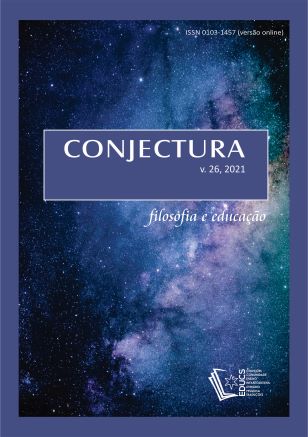Desigualdade e Educação: mais uma revolução inacabada?
DOI:
https://doi.org/10.18226/21784612.v26.e021036Abstract
O artigo propõe-se revisitar a relação entre desigualdade e educação, um tema que acompanha a educação nas sociedades modernas. Apesar do acesso a dados sobre a desigualdade na sociedade e na educação, bem como de muitas análises sobre as origens e tendências que provocam verdadeiros apartheids sociais, tem-se a impressão de que a “metáfora do labirinto”, comum na literatura latino-americana, se aplica à educação. O artigo está dividido em duas partes: na primeira, busca situar o tema da desigualdade como um problema da educação e para a educação, com breve referência a obras clássicas e identificação de alguns lugares pedagógicos que podem servir à perpetuação da desigualdade ou de resistência a ela. A segunda parte, tomando por base pensamentos do início da segunda metade do século passado, gira em torno da pergunta: Estaríamos diante de mais uma revolução inacabada na América Latina? São debatidos dois temas: a atualização da noção de conscientização e as nuanças pedagógicas de conceitos como libertação, exclusão social e (de)colonialidade. Na conclusão, acentua a centralidade de Paulo Freire para compreender a relação entre desigualdade e educação e para a criação de inéditos viáveis na educação e através da educação para a promoção de uma sociedade menos desigual e mais justa.
Palavras-chave: Desigualdade. Democracia. Conscientização. Libertação. (De)colonialidade.
Literaturhinweise
ADORNO, T. W. Educação e emancipação. Rio de Janeiro: Paz e Terra, 1995.
ALTHUSSER, L. Aparelhos ideológicos do estado. 2. ed. Rio de Janeiro: Graal, 1985.
BAQUERO, M.; RANINCHESKI, S; CASTRO, H.C. de. A formação política do Brasil e o processo de democracia inercial. Revista Debates, Porto Alegre, v. 12, n. 1, p. 87-106, jan.-abr. 2018. Doi: 10.22456/1982-5269.81460.
BERGER, P. Pyramids of Sacrifice: Political Ethics and Social Change. New York: Anchor, 1976.
BOURDIEU, P.; PASSERON, J-C. A reprodução. Rio de Janeiro: Francisco Alves, 1975.
BRANDÃO, C. R. O que é educação. 3. ed. São Paulo: Brasiliense, 1981
CAMARA, Dom H. O deserto é fértil: Roteiro para as minorias abraamicas. 7. ed. Rio de Janeiro: Civilização Brasileira, 1977.
CONDINI, M. Fundamentos para uma educação libertadora: Dom Helder Camara e Paulo Freire. São Paulo: Paulus, 2014.
FALS BORDA, O. Las revoluciones inconclusas em America Latina. In: FALS BORDA, O. Una sociología sentipensante para América Latina (Antología). Bogotá: Siglo del Hombre/Clacso, 2009a, p. 395-418.
FALS BORDA, O. La subversión justificada y su importancia histórica. In: FALS BORDA, O. Una sociología sentipensante para América Latina (Antología). Bogotá: Siglo del Hombre/Clacso, 2009b, p. 385-394.
FREIRE, P. Educação como prática da liberdade. 11.ed. Rio de Janeiro: Paz e Terra, 1980.
FREIRE, P. Pedagogia do oprimido. 9. ed. Rio de Janeiro: Paz e Terra, 1981.
FREIRE, P. Pedagogia da autonomia. São Paulo: Paz e Terra, 1996.
GENTILI, P. (Org.). Pedagogia da exclusão: crítica ao neoliberalismo em educação. 2. ed. Petrópolis: Vozes, 1995.
GUTIÉRREZ, G. A theology of liberation. New York: Mayknoll, 1973.
JENCKS, C; SMITH, M; ACLAND, H; BANE, M. J.; COHEN, D.; GINTS, H.; HEYNS, B; MICHELSON, S. Inequality: A Reassessment of the Effect of Family and Schooling in America. New York: Harper & Row, 1972.
KANT, I. Sobre a educação. Piracicaba: Unimep. 1996.
LOCKE, J. On the Conduct of the Understanding. New York: Teachers College, 1966.
LOCKE, J.. A Letter Concerning Toleration. Indianapolis: Bobbs-Merrill, 1955.
MATA, I. Estudos pós-coloniais: Desconstruindo genealogias eurocêntricas. Civitas- Revista de Ciências Sociais, Porto Alegre, v. 14, n. 1, p. 27-42, jan.-abr. 2014. Doi: 10.15448/1984-7289.2014.1.16185.
MORAÑA, M; DUSSEL, E.; JÁUREGUI, C. A. (Eds). Coloniality at Large: Latin America and the Postcolonial Debate. Durham: Duke, 2008.
PIERUCCI, A. F. As ciladas da diferença. São Paulo: Editora 34, 1999.
PIKETTY, T. Capital in the Twenty-First Century. Cambridge, Massachussets: Belknap, 2014.
SANTOS, B. de S. Para além do Pensamento Abissal: Das linhas globais a uma ecologia de saberes. Revista Crítica de Ciências Sociais, n. 78, 2007, p. 3-46. Doi: 10.4000/rccs.753.
SANTOS, B. de S. A crítica da razão indolente: contra o desperdício da experiência. São Paulo: Cortez, 2000.
ROUSSEAU, J.-J.. Do contrato social; Ensaio sobre as origens das línguas; Discurso sobre a origem e os fundamentos da desigualdade entre os homens; Discurso sobre as ciências e as letras. Tradução de Lurdes S. Machado. 3. ed. São Paulo: Abril Cultural, 1983.
SADER, E. Democracia liberal: triunfo e crise. In: SANTOS, B. de S., Democratizar a democracia: os caminhos da democracia participativa. Rio de Janeiro: Civilização Brasileira, 2003, p. 651-678.
SANTOS, T. dos. Teoria da dependência: Balanços e perspectivas. Florianópolis: Insular, 2015.
STRECK, Danilo R. Educação par um novo contrato social. Petrópolis: Vozes, 2003.
STRECK, Danilo R. Da pedagogia do oprimido às pedagogias da exclusão: um breve balanço crítico. Educação & Sociedade. Campinas, vol. 30, n. 107, p. 539-560, maio/ago. 2009. Doi: 10.1590/S0101-73302009000200012.
TILLY, C. O acesso desigual ao conhecimento científico. Tempo Social, revista de sociologia da USP, São Paulo, v. 18, n. 2, p. 47-63, nov.2006. Doi: 10.1590/S0103-20702006000200003.
TOURAINE, A. O que é a democracia. Petrópolis: Vozes, 1994.
WCC (WORLD COUNCIL OF CHURCHES). Pilgrims of the obvious. Risk. Geneva, vol. 11, n. 1, 1975.
Downloads
Veröffentlicht
Zitationsvorschlag
Ausgabe
Rubrik
Lizenz
1. A publicação dos originais implicará a cessão dos direitos autorais à revista Conjectura.
2. Os textos não poderão ser reproduzidos sem autorização da revista depois de aceitos.

Este trabalho está licenciado com uma Licença Creative Commons - Atribuição 4.0 Internacional.









